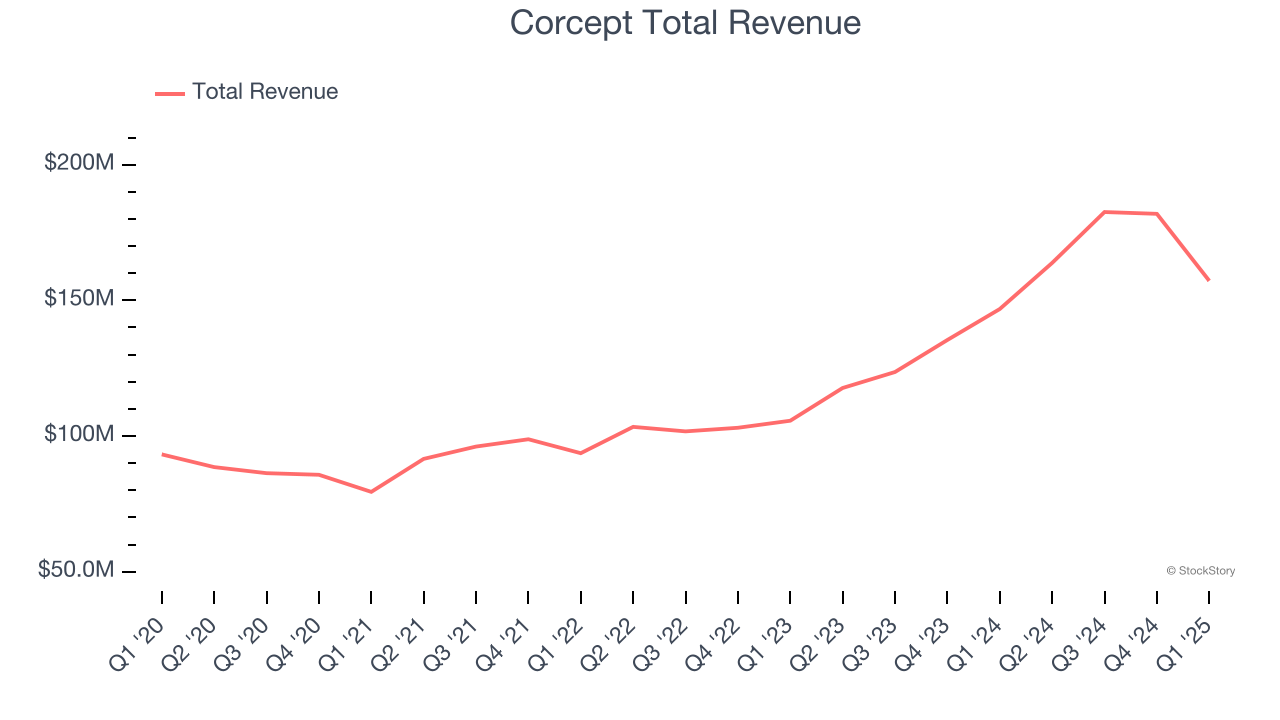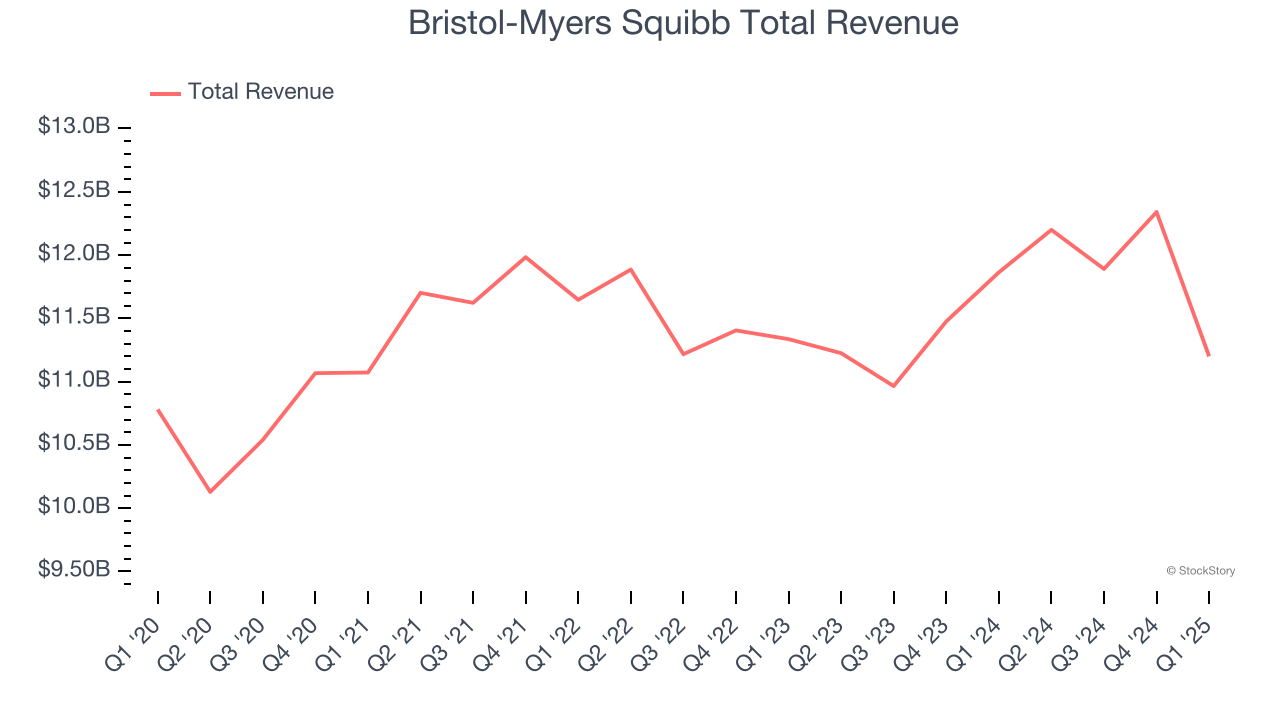
Let’s dig into the relative performance of Corcept (NASDAQ: CORT) and its peers as we unravel the now-completed Q1 branded pharmaceuticals earnings season.
The branded pharmaceutical industry relies on a high-cost, high-reward business model, driven by substantial investments in research and development to create innovative, patent-protected drugs. Successful products can generate significant revenue streams over their patent life, and the larger a roster of drugs, the stronger a moat a company enjoys. However, the business model is inherently risky, with high failure rates during clinical trials, lengthy regulatory approval processes, and intense competition from generic and biosimilar manufacturers once patents expire. These challenges, combined with scrutiny over drug pricing, create a complex operating environment. Looking ahead, the industry is positioned for tailwinds from advancements in precision medicine, increasing adoption of AI to enhance drug development efficiency, and growing global demand for treatments addressing chronic and rare diseases. However, headwinds include heightened regulatory scrutiny, pricing pressures from governments and insurers, and the looming patent cliffs for key blockbuster drugs. Patent cliffs bring about competition from generics, forcing branded pharmaceutical companies back to the drawing board to find the next big thing.
The 10 branded pharmaceuticals stocks we track reported a satisfactory Q1. As a group, revenues were in line with analysts’ consensus estimates.
While some branded pharmaceuticals stocks have fared somewhat better than others, they have collectively declined. On average, share prices are down 4.8% since the latest earnings results.
Corcept (NASDAQ: CORT)
Focusing on the powerful stress hormone that affects everything from metabolism to immune function, Corcept Therapeutics (NASDAQ: CORT) develops and markets medications that modulate cortisol to treat endocrine disorders, cancer, and neurological diseases.
Corcept reported revenues of $157.2 million, up 7.1% year on year. This print fell short of analysts’ expectations by 11.6%, but it was still a satisfactory quarter for the company with an impressive beat of analysts’ EPS estimates.

Corcept pulled off the highest full-year guidance raise but had the weakest performance against analyst estimates of the whole group. The results were likely priced in, however, and the stock is flat since reporting. It currently trades at $74.76.
Is now the time to buy Corcept? Access our full analysis of the earnings results here, it’s free.
Best Q1: Bristol-Myers Squibb (NYSE: BMY)
With roots dating back to 1887 and a transformative merger in 1989 that gave the company its current name, Bristol-Myers Squibb (NYSE: BMY) discovers, develops, and markets prescription medications for serious diseases including cancer, blood disorders, immunological conditions, and cardiovascular diseases.
Bristol-Myers Squibb reported revenues of $11.2 billion, down 5.6% year on year, outperforming analysts’ expectations by 3.9%. The business had a very strong quarter with an impressive beat of analysts’ EPS estimates and full-year revenue guidance slightly topping analysts’ expectations.

Bristol-Myers Squibb achieved the biggest analyst estimates beat among its peers. Although it had a fine quarter compared its peers, the market seems unhappy with the results as the stock is down 3.3% since reporting. It currently trades at $46.90.
Is now the time to buy Bristol-Myers Squibb? Access our full analysis of the earnings results here, it’s free.
Pfizer (NYSE: PFE)
With roots dating back to 1849 when two German immigrants opened a fine chemicals business in Brooklyn, Pfizer (NYSE: PFE) is a global biopharmaceutical company that discovers, develops, manufactures, and sells medicines and vaccines for a wide range of diseases and conditions.
Pfizer reported revenues of $13.72 billion, down 7.8% year on year. This number missed analysts’ expectations by 1.6%. Taking a step back, it was a mixed quarter as it also recorded a solid beat of analysts’ organic revenue estimates but a miss of analysts’ full-year EPS guidance estimates.
Pfizer had the slowest revenue growth among its peers. The stock is flat since reporting and currently trades at $23.06.
Read our full, actionable report on Pfizer here, it’s free.
Collegium Pharmaceutical (NASDAQ: COLL)
Pioneering abuse-deterrent technology in a field plagued by addiction concerns, Collegium Pharmaceutical (NASDAQ: COLL) develops and markets specialty medications for treating moderate to severe pain, including abuse-deterrent opioid formulations.
Collegium Pharmaceutical reported revenues of $177.8 million, up 22.7% year on year. This print surpassed analysts’ expectations by 2.3%. Overall, it was a satisfactory quarter as it also put up a decent beat of analysts’ EPS estimates.
The stock is up 8% since reporting and currently trades at $29.47.
Read our full, actionable report on Collegium Pharmaceutical here, it’s free.
Market Update
As a result of the Fed’s rate hikes in 2022 and 2023, inflation has come down from frothy levels post-pandemic. The general rise in the price of goods and services is trending towards the Fed’s 2% goal as of late, which is good news. The higher rates that fought inflation also didn't slow economic activity enough to catalyze a recession. So far, soft landing. This, combined with recent rate cuts (half a percent in September 2024 and a quarter percent in November 2024) have led to strong stock market performance in 2024. The icing on the cake for 2024 returns was Donald Trump’s victory in the U.S. Presidential Election in early November, sending major indices to all-time highs in the week following the election. Still, debates around the health of the economy and the impact of potential tariffs and corporate tax cuts remain, leaving much uncertainty around 2025.
Want to invest in winners with rock-solid fundamentals? Check out our 9 Best Market-Beating Stocks and add them to your watchlist. These companies are poised for growth regardless of the political or macroeconomic climate.
Join Paid Stock Investor Research
Help us make StockStory more helpful to investors like yourself. Join our paid user research session and receive a $50 Amazon gift card for your opinions. Sign up here.

